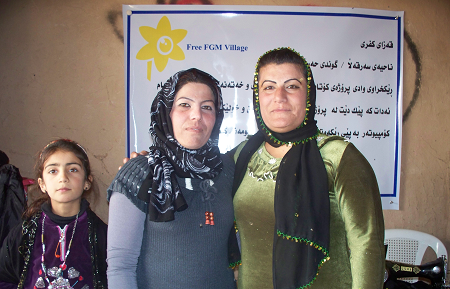Seven villages in Kurdish nothern Iraq made the start. In most of them the mutilation rate was almost 100%. After learning about the negative effects of female genital mutilation (FGM) and discussing this issue with the team and among themselves, an overwhelming majority of the women of these villages, especially the young generation, supported the idea of stopping the practice. Not a single case of FGM happened since in any of these villages.

The people appreciated the “incentives”, the small projects Wadi offered, but their stance against FGM developed independently. It is a decision from the heart. Each of the mayors signed a treaty in which he promised to end the practice once and for all. A Stop FGM roadsign was installed at the entrance of the village.
On the local level, the FGM-free villages had a tremendous impact on neighbouring communities. Many of them asked to become part of the programme as well, and when, due to limited funds, our staff had to decline, they assured they would abandon FGM anyway.
Female genital mutilation, along with other types of violence against women and children, is deeply rooted in local culture. During more than five years of awareness raising Wadi staff has learned that in principle people are ready for a change. The FGM rate has dropped considerably in those areas that received awareness almost from the beginning, i.e. 2004 when Mobile Teams first discovered FGM being practiced in Iraqi Kurdistan.

But we cannot be everywhere. Our resources are limited and the state still does not meet its responsibilities on this field. We needed people to inspire other people in order to create a snowball effect: a movement.
The FGM-free village concept was developed to encourage abandoning the practice and create role models. We support those ready for a change, and we try to make their voices heard, thus encouraging others to follow. Villages may join the network and receive small community projects in exchange for publicly committing themselves to stop FGM and all violence against women and children.
The villages are free to choose the kind of project they would like. One village decided for an electric generator, another wished a community tent, a third one got makeshift classrooms for the broken primary school and for the older pupils transport to a secondary school some miles away. Here is the story of Toutakhel, an amazing village which made it into world press.
On the local level, the FGM-free villages had a tremendous impact on neighbouring communities. Many of them asked to become part of the programme as well, and when, due to limited funds, our staff had to decline, they assured they would abandon FGM anyway, since they had been convinced it is harmful and unneccessary.

The FGM-Free Communities Programme used to be funded by the U.S. State Department and UNICEF. It is now depending on private donations.
